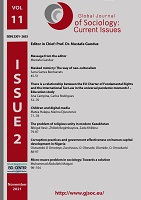Corruption practices and government effectiveness on human capital development in Nigeria
Corruption practices and government effectiveness on human capital development in Nigeria
Author(s): Oluwatobi O. Omotoye, Zacchaeus O. Olonade, Olumide O. OmodunbiSubject(s): Government/Political systems, Penal Policy, Human Resources in Economy, Corruption - Transparency - Anti-Corruption
Published by: Birlesik Dunya Yenilik Arastirma ve Yayincilik Merkezi
Keywords: Corruption; human capital; development; government effectiveness; Nigeria;
Summary/Abstract: The study assessed the impact of corruption practices and government effectiveness (GE) on human capital development (HCD) in Nigeria between the years 2003 and 2020, Panel data from 2003 to 2020 were obtained from the database of United Nations Development Programme, World Development Indicators and CIP and were analysed using the ordinary least square method which is suitable for the dataset. The study found that corruption has a significant relationship with HCD in Nigeria while the relationship between GE and HCD is not significant. The research implication is that the persistent problem of slow and sometimes stagnant HCD and growth in Nigeria can be reversed by improving GE and by reducing corrupt practices in the country. The paper concluded that corruption practices have a very strong influence on HCD in Nigeria, while the relationship between GE and HCD is insignificant. It was recommended that Nigeria should institute stiffer punishments for offenses bothering on corruption practices.
Journal: Global Journal of Sociology: Current Issues
- Issue Year: 11/2021
- Issue No: 2
- Page Range: 88-97
- Page Count: 10
- Language: English

